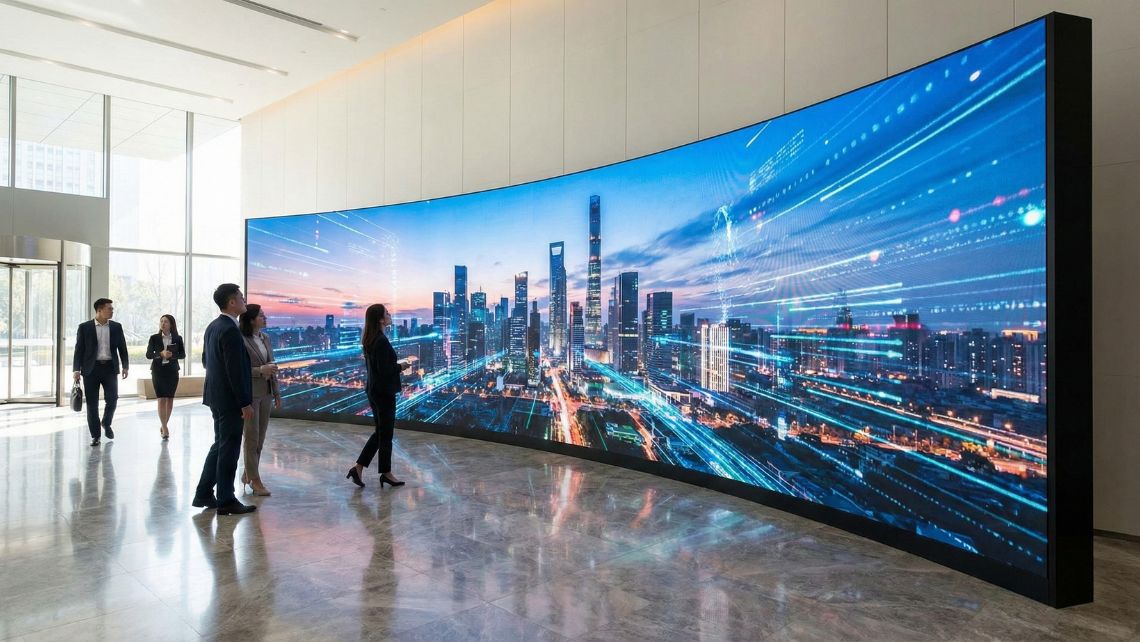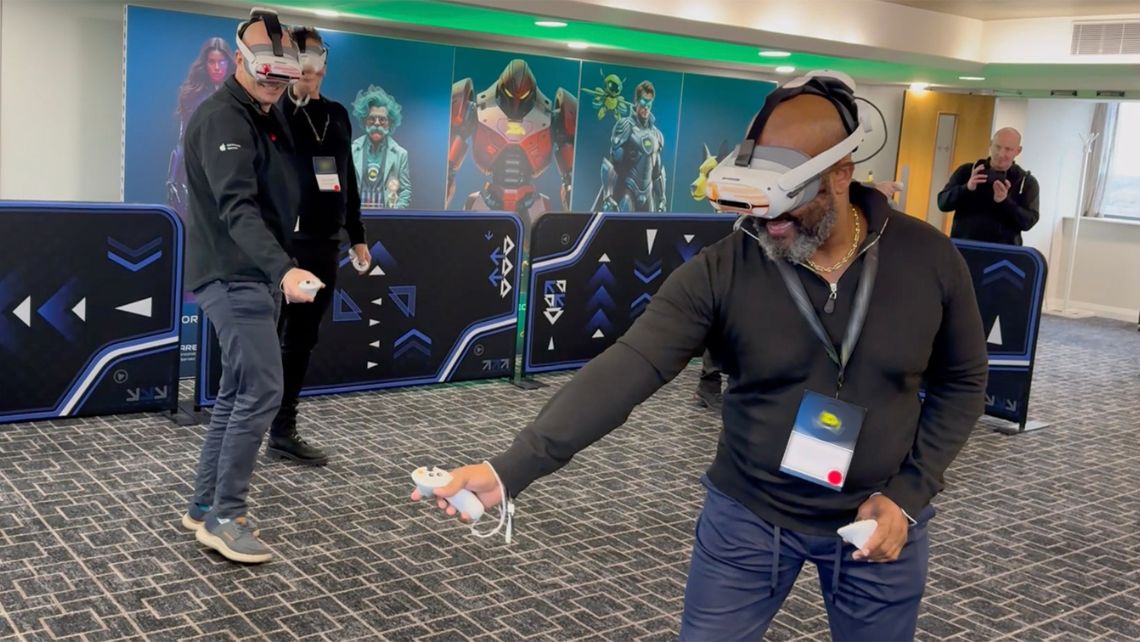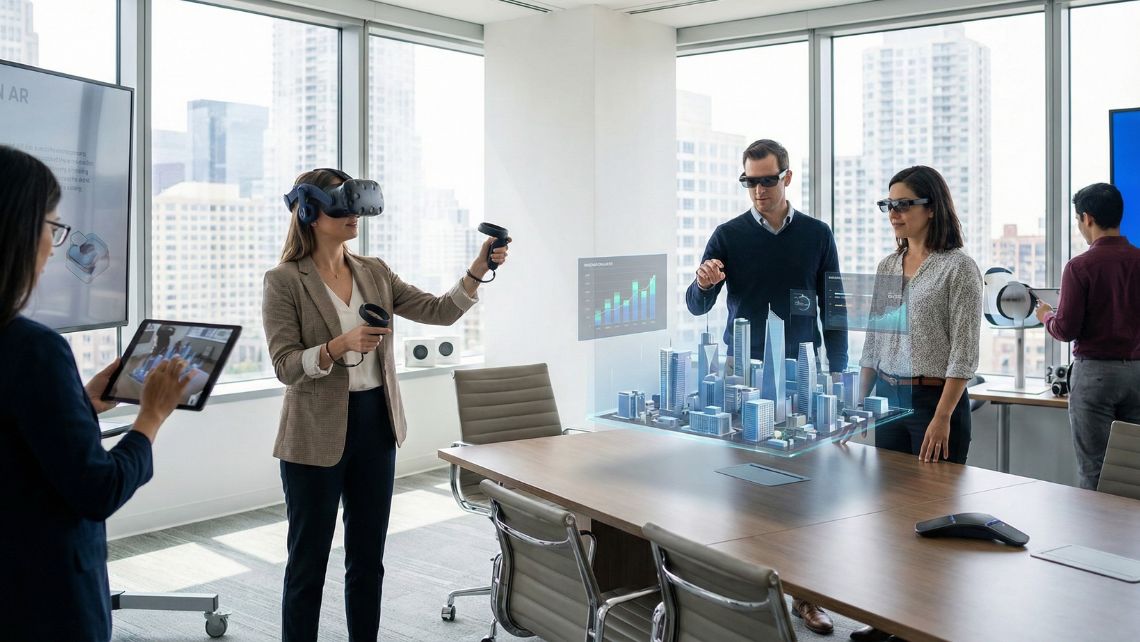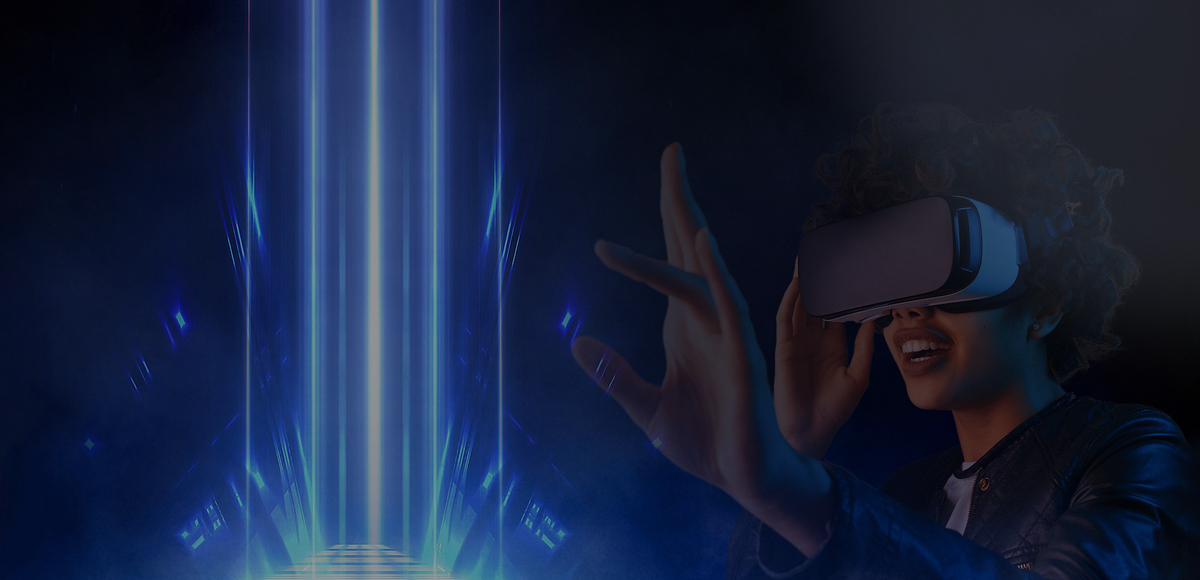
Why VR Concerts Are Future of Hosted Entertainment Events
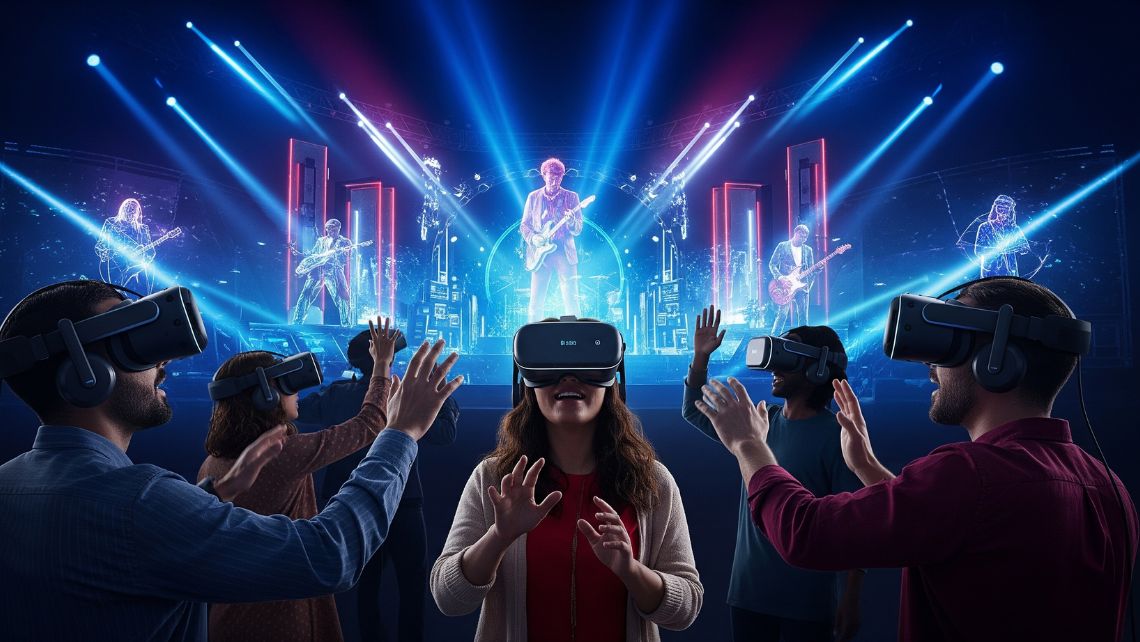
VR concerts are rapidly transforming the landscape of hosted entertainment events. Once considered a novelty, they now stand at the forefront of immersive digital experiences—where technology and creativity merge to transcend physical limitations. As entertainment continues to evolve post-pandemic, audiences demand more accessibility, interactivity, and global reach. In this context, VR concerts provide a compelling alternative to traditional live events, offering immersive worlds that amplify performance and participation alike.
This seismic shift is not just a trend. It represents a cultural and technological evolution in how artists engage audiences, and how brands create memorable, hosted event experiences. With advanced tools like spatial audio, digital twins, and virtual venue design, these performances are redefining what’s possible in entertainment.
Immersive Studio is proud to be leading this charge. Through our Hosted VR Events Solutions, we help organisations, artists, and production companies deliver fully managed, immersive concerts that captivate global audiences without the limits of geography, scale, or physical venue costs.
The Rise of VR concerts as Hosted Entertainment Events
The evolution of VR concerts has reshaped how audiences experience live performances. Unlike livestreams or on-demand video, VR events offer real-time presence inside digital venues, blending spatial realism with artistic freedom. For hosted events—especially those aimed at broad, digitally native audiences—this model is becoming increasingly attractive.
From Game Environments to Concert Arenas
The first major wave of VR concerts was born in gaming environments. Notably, Marshmello’s 2019 concert in Fortnite drew over 10.7 million concurrent players, marking a turning point for virtual performances. That event wasn’t just a livestream—it was a fully interactive concert inside a game world. See coverage from The Verge.
Travis Scott followed with his Astronomical concert inside Fortnite in 2020, reaching over 27 million unique attendees. View breakdown via BBC. These events showcased the power of immersive interaction, setting the stage for a broader acceptance of VR concerts beyond gaming platforms.
Hosted Concerts for a Global Audience
What makes VR concerts particularly suited to hosted entertainment events is their inherent scalability. Organisers are no longer restricted by venue size or regional logistics. Fans from Tokyo to Manchester can simultaneously attend the same virtual performance with zero travel. This shift aligns perfectly with corporate brand activations, fan engagement strategies, and interactive entertainment formats.
Immersive Studio’s Perspective
At Immersive Studio, we see these developments not as gimmicks, but as strategic tools for forward-thinking organisations. Our hosted VR events are built with complete technical infrastructure—from immersive environments and 3D assets to content deployment, ticketing, and live audience support. The result is a turnkey solution for delivering stunning, high-impact VR concerts to global audiences.
Key Advantages of VR concerts for Hosted Events
The reason VR concerts are taking centre stage in hosted event planning is because they solve several long-standing challenges in live entertainment while unlocking bold new creative opportunities.
Global Accessibility Without Physical Limitations
Traditional concerts are constrained by geography, cost, and venue size. In contrast, VR concerts offer instant accessibility from anywhere in the world. Fans can attend using VR headsets or desktop interfaces, removing the need for international travel or costly logistics. This has massive implications for hosted entertainment events, especially when targeting audiences across multiple countries.
For example, the platform Wave has hosted avatar-based performances for artists like The Weeknd, delivering high-fidelity VR concerts to hundreds of thousands of attendees across devices. Such flexibility is ideal for corporate launches, music festivals, and branded activations that need to scale globally. Read more about it here.
Enhanced Audience Engagement and Interaction
Unlike livestreams or video replays, VR concerts allow audiences to become participants rather than passive viewers. Attendees can customise their avatars, explore virtual stages, interact with others, and even influence aspects of the show. This interactive format makes every event feel unique and personalised—attributes that are crucial for hosted events seeking to make lasting impressions.
A great example is Melon’s collaboration with Riot Games, where League of Legends characters performed live in a dynamic, interactive VR concert. The show blurred the line between game, music, and immersive theatre—hallmarks of successful hosted entertainment today.
Cost-Efficient Production and Monetisation
VR concerts dramatically reduce the cost of venue rental, travel, staging, and logistics. At the same time, they open up new monetisation options such as digital merch, premium ticketing tiers, virtual meet-and-greets, and brand sponsorship. For companies or event organisers, this creates a financially sustainable model that’s less volatile and easier to scale.
The Immersive Studio Advantage
Immersive Studio specialises in delivering hosted VR event solutions that leverage all these advantages. Our service encompasses everything from conceptual development and environment design to broadcast-quality streaming and post-event analytics. For entertainment brands and creative agencies, this means a reliable partner to transform any musical or performance concept into a compelling, immersive concert event—fully hosted and entirely virtual.
Emerging Technologies Making VR concerts the Future
The ongoing evolution of VR concerts is inseparable from the development of emerging immersive technologies. From improved hardware and spatial audio to the introduction of AI-powered avatars, each innovation is shaping the next generation of hosted entertainment events.
Spatial Audio and 3D Sound Design
One of the most defining technologies behind the immersive appeal of VR concerts is spatial audio. Unlike stereo sound, spatial audio reacts to the user’s head movement and positioning, creating the sensation of a live 360° soundscape. This enhances emotional engagement and replicates the experience of standing at the centre of a real-life concert.
Innovations in this field, like Apple’s support for spatial audio in Vision Pro and Dolby Atmos-enabled VR headsets, are making it possible to render lifelike concert acoustics in real time. Platforms such as Stageverse and Sensorium Galaxy already integrate spatial sound into their hosted event formats, proving its value for fully immersive concert delivery.
Motion Capture and Avatar Performance
Motion capture technology enables artists to perform as avatars, bringing new visual storytelling possibilities to VR concerts. Using body suits or optical systems, artists can map real-time movements onto digital personas, creating synchronised, dynamic performances within virtual environments.
AI-Driven Personalisation and Crowd Simulation
AI plays a key role in enabling intelligent crowd reactions, real-time camera switching, and adaptive environments within VR concerts. These features make virtual audiences feel present and reactive, even when separated by continents.
Hardware Innovation and Cross-Platform Access
Advancements in VR hardware are also lowering the barrier to entry for audiences. Devices such as the Meta Quest 3 and Apple Vision Pro deliver high-resolution, untethered access to virtual experiences without complicated setup. This means VR concerts can now reach consumers using mobile apps, desktop interfaces, and standalone headsets.
Role of Hosted VR Event Solutions by Immersive Studio
At the heart of delivering unforgettable VR concerts lies the need for specialist infrastructure, design, and management. Immersive Studio offers a fully managed Hosted VR Events Solution designed to help clients deliver concerts that are technically robust, visually arresting, and emotionally impactful.
End-to-End Event Production
Immersive Studio provides complete production capability for VR concerts—from concept to execution. Our team develops immersive environments tailored to each artist or brand’s vision, using cinematic techniques and 3D modelling to build unforgettable virtual venues. This includes stage design, crowd rendering, lighting simulation, and interactive UI layouts.
Whether you’re designing an avatar-based concert or recreating a famous venue digitally, we ensure that every element reflects the highest standards of immersive design and user engagement. For hosted entertainment events, this ensures cohesion, creative control, and seamless user journeys.
Real-Time Performance Integration and Broadcasting
A key aspect of successful VR concerts is live performance synchronisation. Immersive Studio integrates real-time performance capture—whether through mocap suits, volumetric video, or live-streaming tools—into the VR environment. Artists can perform from anywhere in the world while audiences attend in real time via VR headsets or browser interfaces.
We also ensure reliable live broadcasting using low-latency streaming protocols and scalable server infrastructure. This guarantees stable, high-quality performance delivery during peak audience loads—critical for ticketed, hosted entertainment events.
Multi-Platform Access and Monetisation
Our VR concerts can be deployed across multiple platforms, including desktop, mobile, and major VR headsets. We also provide integrated ticketing, digital merchandise modules, and interactive elements that allow audiences to purchase, engage, and participate more deeply in the event.
This flexibility allows clients to target broader audiences without compromising experience quality. As shown in events by Melon, cross-platform availability is a core driver of VR concert growth and accessibility.
Strategic Hosting and Technical Support
Hosted VR events need strong backend architecture. Immersive Studio provides robust hosting environments with cloud-based scalability, real-time analytics, and multilingual support. We manage everything from audience onboarding to post-event reporting, ensuring a smooth, professionally executed event.
Clients can rely on our event strategists, developers, and immersive content experts to deliver every aspect of the VR concert—from user journey planning and asset deployment to moderation and technical contingency planning. This makes our Hosted VR Events Solution ideal for brands, festivals, and artists seeking to deliver next-generation entertainment experiences without the complexity of managing it themselves.
Building the Future with Immersive Studio
By choosing Immersive Studio, clients gain more than a service provider—they gain a strategic partner committed to pushing the boundaries of what’s possible in digital entertainment. Whether for a brand launch, a music festival, or an artist showcase, our Hosted VR Events Solutions offer the infrastructure and imagination needed to deliver truly pioneering VR concerts.
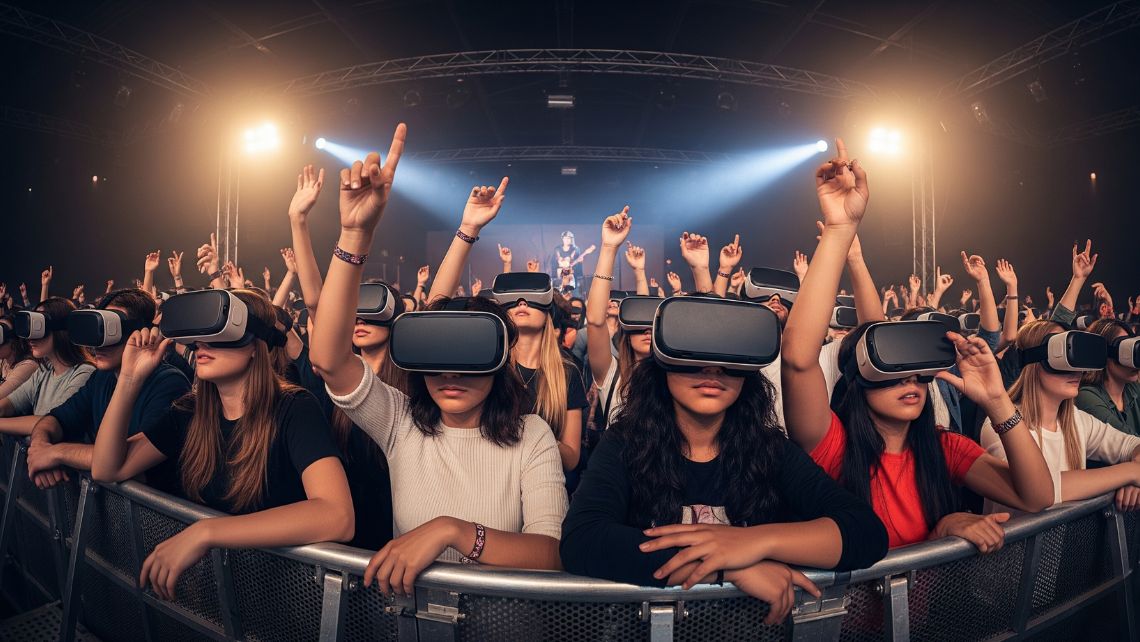
Trends and Projections: Why VR concerts will Dominate Hosted Events
With audiences craving deeper experiences and organisers seeking scalable solutions, the momentum behind VR concerts is only set to accelerate. Several trends confirm why this format will dominate the future of hosted entertainment.
Growth in Immersive Event Adoption
Since the COVID-19 pandemic, the events industry has embraced immersive technology to maintain audience engagement. This shift has normalised the idea of attending live performances from home. Platforms like Napster and Infinite Reality are banking on this future, merging music and metaverse platforms to deliver next-generation concerts.
The fusion of live entertainment and VR creates a new business model where experiences are borderless, ticketing is frictionless, and brand integration is deeply experiential. Hosted events will increasingly adopt this structure for festivals, product launches, and exclusive performances.
Expansion of Virtual Venues and Stadiums
Physical venues come with limits on geography, time zones, and capacity. Virtual venues, however, are only limited by imagination. The Las Vegas MSG Sphere serves as an example of how immersive architecture is influencing VR-ready entertainment models. As such concepts gain traction, expect more digital-first arenas designed specifically for VR concerts.
These environments can be customised for every performer, brand, or theme. Hosted events can thus evolve into narrative-driven experiences, helping sponsors, artists, and audiences co-create meaning within virtual worlds.
Immersive Studio’s Strategic Vision
At Immersive Studio, we recognise that these trends aren’t simply technical—they’re cultural. Our Hosted VR Events Solutions are designed for scalability, adaptability, and high creative impact. Whether you’re launching a product, celebrating an album release, or hosting a global fan meet-up, our team delivers the full-stack support needed to lead in this fast-changing landscape.
The future of hosted entertainment lies in immersive, globally accessible formats. VR concerts are not a replacement for live music—they are an evolution of it, offering experiences we never thought possible.
Wrapping Up
The acceleration of VR concerts marks a defining shift in how we host and experience live entertainment. No longer confined to physical spaces or local audiences, artists and organisers can now reach global communities through immersive, hosted virtual platforms. These digital concerts offer more than convenience—they bring creativity, interactivity, and inclusivity to the heart of every event.
As real-world examples continue to validate the format—from Marshmello’s Fortnite debut to PLAVE’s virtual idol tours—it’s clear that VR concerts are not just a temporary trend. They are becoming a foundational component of modern entertainment, especially for hosted events that demand innovation and scale.
Immersive Studio is at the forefront of this revolution. Our Hosted VR Events Solutions provide comprehensive support for those ready to explore this new frontier. With tailored environments, real-time interactivity, multi-platform access, and seamless technical integration, we help clients deliver VR concerts that leave lasting impressions.
As audiences continue to demand richer digital experiences, and as technology evolves, VR concerts will define the next era of hosted entertainment. For those who act now, the possibilities are not just exciting—they’re limitless.
How Immersive Studio Can Help
At Immersive Studio, we’re not just delivering VR—we’re shaping the future of team development. With customisable setups, mobile deployments, and outcome-driven design, we help your team reach its full potential in an environment that’s memorable, measurable, and meaningful.
Whether you’re planning a one-off event or looking to embed immersive strategies into your wider culture plan, free roam virtual reality through Immersive Studio offers unmatched opportunity and impact.
Frequently Asked Questions - VR Concerts
What are VR concerts?
VR concerts are live or pre-recorded musical performances experienced through virtual reality platforms. These events take place in fully immersive digital environments, allowing attendees to engage with the performance using VR headsets or desktop interfaces. Unlike traditional livestreams, VR concerts provide spatial interaction, avatar customisation, and real-time audience engagement. They often include interactive stages, animated visuals, and virtual merchandise, creating a dynamic experience that replicates and enhances in-person attendance.
How do VR concerts work?
VR concerts work by combining several technologies—3D modelling, motion capture, spatial audio, and real-time streaming—to deliver interactive events inside virtual environments. Artists perform live or through pre-recorded sessions that are synchronised with digital avatars or volumetric footage. Users attend these concerts using compatible VR devices or PCs. Platforms such as Wave and Sensorium Galaxy allow participants to move through virtual venues, interact with other fans, and even change perspectives during the show. These features make VR concerts ideal for hosted events that require immersive brand storytelling.
Can VR concerts replace live physical concerts?
While VR concerts won’t replace physical concerts entirely, they offer a powerful complement and, in many cases, a superior alternative for hosted entertainment events. They provide broader accessibility, reduced costs, and creative freedom that traditional venues cannot match. Events like Travis Scott’s Astronomical demonstrated how VR concerts can reach millions simultaneously while delivering cinematic immersion. For artists and brands aiming to extend reach or offer unique experiences, VR concerts can be more effective than physical shows, particularly when scalability and innovation are priorities.
What equipment is needed to attend a VR concert?
To attend VR concerts, users typically need a VR headset such as Meta Quest, Apple Vision Pro, or PICO XR. However, many platforms also support desktop and mobile participation for broader accessibility. For example, PICO XR’s platform allows users to experience concerts through standard displays, making them accessible even without VR gear. High-speed internet and headphones are recommended for optimal audio-visual immersion. Most hosted events include pre-event onboarding to ensure users can navigate and interact comfortably.
How much do VR concert tickets typically cost?
Ticket prices for VR concerts vary depending on the platform, artist, and access level. Some events, like those hosted on Fortnite, are free, supported by brand sponsorships. Others, like concerts on Stageverse, offer tiered pricing models, with premium features such as backstage access or virtual merchandise. On average, ticket prices range from £5 to £30, making VR concerts an affordable alternative to traditional gigs. For hosted events, pricing structures can be customised to match audience size, platform reach, and monetisation strategy.
What companies or artists have held VR concerts?
Several major artists and companies have embraced VR concerts. Marshmello, Travis Scott, Ariana Grande, and Justin Bieber have all delivered performances inside virtual platforms. Companies like Sensorium Galaxy, Wave, and Melon lead the development of VR concert platforms. These events are no longer experimental—they are fully produced, hosted experiences backed by significant investment and global fan engagement.
Are VR concerts accessible and safe for global audiences?
Yes, VR concerts are built to be globally accessible, with inclusivity and digital safety at their core. Cross-platform compatibility ensures fans from any region can participate using various devices. Hosted VR concerts also offer moderation tools, privacy settings, and audience management features to maintain a safe environment. Platforms such as Vatom and Decentraland are actively developing safety protocols for immersive events. With multilingual support and scalable infrastructure, VR concerts are one of the most accessible and manageable formats for international entertainment delivery.
